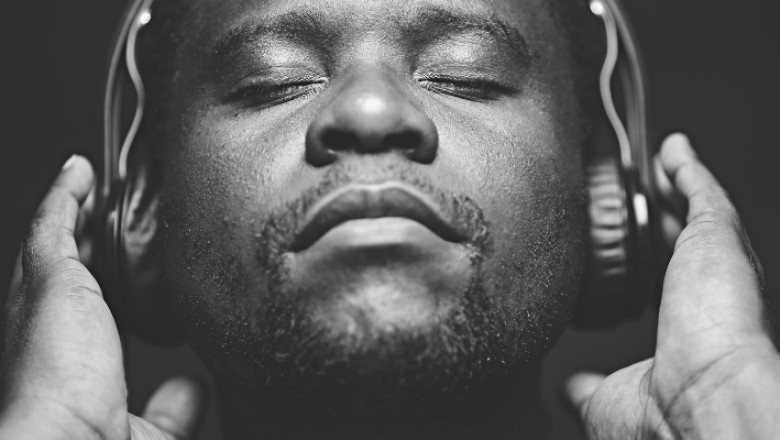views

Listen up! How Relaxation Music Therapy can Relieve Stress
How can music help you manage stress? Stress has long term health effects, so learning coping strategies is essential to mental and physical health. With work constantly piling up and tasks becoming seemingly more and more difficult, people are seeking out alternative therapy methods to relax. Stress comes in a multitude of forms, both physical and mental, and can have both positive and negative outcomes short term. What if something as simple as a music playlist could help relieve stress?
Music has become extremely relevant in modern society, with radios installed in almost every car and new artists constantly releasing music. This shared attraction to music, however, is not something that has only sprouted recently. Research done by Jessica Phillips-Silver and Laurel J. Trainor suggests that musical understanding is present at birth. These neuroscientists studied infant attentive patterns and physical movements to deduce that newborns can perceive music and even prefer to “rock to the beat”.
These findings indicate that musical perception is not something that is necessarily learned, but is instead an innate ability present in neo-typical individuals. Therefore, music perception, or the perception of its components, is an ability that has evolved over time to improve one’s quality of life. Now the question is, why music perception? How can perceiving beats and rhythms be beneficial to the human race? Well a possible answer: stress relief.
In response to an event which one determines as threatening, the body elicits a stress response. The stress response is a collection of physiological and behavioral responses meant to mobilize the body's energies and combat the threat at hand. In doing so, hormones in the body are being released and repressed according to the individual's needs. Cortisol, for example, is released upon being exposed to a stressor, and in turn, both one’s heart rate and blood pressure are elevated. The presence of cortisol during a highly stressful situation, such as a fire, can be extremely beneficial, as it triggers one’s fight or flight response. This response makes fats available for energy, increases blood flow to the muscles, and ultimately triggers the behavioral response needed to evade the present dangerous situation. However, the presence of cortisol in one’s bloodstream for prolonged periods of time can lead to negative consequences.
Chronic stress is the result of overexposure to cortisol and other stress hormones in the body. Through constant repeated exposure, individuals become hypersensitive to their own stress response, meaning it becomes easier to trigger and more difficult to shut down. Over time, individuals experiencing chronic stress will develop impairments in brain structures, such as the prefrontal cortex and hippocampus, along with experiencing cognitive degeneration. Therefore, exposure to stressors and undergoing a stress response can be beneficial, but only in moderation. A possible solution to maintaining this balance is, in fact, music.
Music is used in a variety of contexts, such as promoting different moods in different environments. Because music can have such a drastic effect on how people feel and behave, researchers have begun investigating how music can benefit people in multitudes of manners. Those manners being how music can promote physiological well being, how music can improve mental health, and ultimately how music is being used in current medical practices.
Researchers have investigated the ways in which music can alter stress states and mental health. Dr. Luciano Bernardi et. al measured cardiovascular and respiratory variables of different patients when listening to 6 different music styles in random order. By measuring heart rate, blood pressure, and breathing patterns of each patient, Dr. Luciano was able to deduce how varying tempos affect a person’s stress state. The results showed that tempo is key, with slower music inducing slower heart rhythms and relaxed breathing patterns, and faster tempos resulting in the opposite.
Additionally, psychologists Nikki Rickard and W.E.J. Knight performed a similar experiment in which a stressor was introduced with and without music while physiological measures were recorded. In this experiment, undergraduate students were tasked with preparing an oral presentation, which served as the stressor. Students either prepared said oral presentations while listening to Pachelbel’s Canon in D major, or in silence. Physiological measures obtained showed that heart rate and blood pressure were dramatically increased by the stressor, however, in the presence of relaxing music, these spikes were prevented. Both experiments emphasize the dramatic effect music can have on a person’s physiological state. When placed in a stressful situation, music has been shown to lower heart rate and reduce blood pressure, resulting in a relaxing effect. But before reaching that conclusion, one must observe how music impacts an individual’s subjective well being, being what they feel and can report themselves.
Although music can promote physical wellbeing, how does it affect the individual’s conscious state of mind? The University of Marburg, Germany conducted a study that analyzed subjects in real life situations, rather than in experimental settings. University students were instructed to describe their current music listening behaviors and stress levels four times a day for 10 total days. Participants reported that stress levels were reduced when listening to music. However, a fascinating finding within this study was observed when participants were told to listen to music with the intention of relaxing. By having relaxation in mind, participants' subjective stress levels were reduced significantly, compared to those that listened to music without the specific instruction. Additionally, a subsample of students provided saliva samples in order to measure cortisol levels in accordance with self measurements. The cortisol levels coincided with what the student’s reported, with lower cortisol levels measured in subjects who listened to music, especially those with the intention of relaxing.
For a larger scale of reference, Dr. Martina de Witte et. al performed 2 meta-analyses, consisting of a total of 9617 participants, in order to deduce the effects of music on psychological well being. A meta-analysis is a combination of data from similar studies meant to observe an overall trend in said field. In this case, Dr. Martina De Witte recorded data from experiments that observed how music and psychological well being go hand in hand. The results taken from each meta-analysis showed that music had a significant effect on emotional states, reducing worry, anxiety, and restlessness. This was attributed to music affecting the amygdala, which is the brain’s emotional processing center. Music was also found to trigger dopamine release in the mesolimbic reward brain system. This brain system is integral in producing the feeling of happiness, which can be a precursor to stress reduction and relaxation. Given music’s observed potential to stabilize and improve mental states, clinicians take interest in music’s possible therapeutic benefits.
The stress relieving effect of music can not only be seen in research studies, but also in current health practices. Suzanne B. Hanser and Larry W. Thompson explored how therapeutic practices involving music could benefit adults suffering with depression. The three following groups were observed: a group consisting of individuals receiving in person stress reduction music therapy, a group in which said subjects received moderate therapist intervention through weekly phone calls, and a control group receiving no music therapy. After an 8 week period, the results had shown that both groups of participants undergoing music therapy performed significantly better on standardized tests of depression compared to the control group. Self esteem and mood were found to improve immensely and these results remained true for an additional 9 month period in which follow up tests were conducted. Music therapy has also been observed in comparison to other forms of therapy.
Dr. Sergio Castillo-Pérez et. al studied the contrast between the effects of psychotherapy vs. music therapy on patients with low to medium grade depression. Subjects undergoing psychotherapy experienced cognitive behavioral therapy, which focuses on developing coping strategies for detrimental behaviors and improving emotional control. Patients within the musical therapy group were exposed to classical music during self administered sessions, along with one group session per week at the hospital. The study lasted a total of eight consecutive weeks. The data demonstrated a statistical significance between the effectiveness of both therapy methods. Music therapy was found to better improve patient symptoms of depression. Classical music not only decreased depressive symptoms, but induced beneficial feelings overall. Although more studies replicating these results are required, these findings promote a bright future in the application of music therapy.
As demonstrated by the aforementioned studies, the possible applications of music in everyday life are vast. Not only can music be utilized for enjoyment, but for the advancement of mental health. Additionally, physiological health can be positively impacted by regularly listening to soothing music. The weight of the world around us can sometimes force us to push mental health to the side, and it can be difficult to know where to start. Music can be an easy and manageable source of stress reduction that can fit into your daily routines. So next time you feel overwhelmed, check out your weekly playlist for some R&R time. Once you're calm, you'll be able to spend more time on introspecting deeper to solve the source of your stress or anxiety. New therapy apps such as LIFE Intelligence can help you do just that, for stress management and overall mental health.
References
Phillips-Silver, J. (2005). Feeling the Beat: Movement Influences Infant Rhythm Perception. Science, 308(5727), 1430–1430.
Bernardi, L., Porta, C., & Sleight, P. (2006, April 01). Cardiovascular, cerebrovascular, and respiratory changes induced by different types of music in musicians and non-musicians: The importance of silence.
Knight, W. & Rickard, Nikki. (2001). Relaxing Music Prevents Stress-Induced Increases in Subjective Anxiety, Systolic Blood Pressure, and Heart Rate in Healthy Males and Females. Journal of music therapy. 38. 254-72.
Linnemann, A., Ditzen, B., Strahler, J., Doerr, J., & Nater, U. (2015, June 21). Music listening as a means of stress reduction in daily life.
Witte, M. et al. (2019, July 15). Effects of music interventions on stress-related outcomes: A systematic review and two meta-analyses.
Hanser, Suzanne & Thompson, Larry. (1994). Effects of Music Therapy Strategy on Depressed Older Adults. Journal of gerontology. 49. P265-9.
Castillo-Pérez, S., Gómez-Pérez, V., Velasco, M., Pérez-Campos, E., & Mayoral, M. (2010, July 29). Effects of music therapy on depression compared with psychotherapy.












